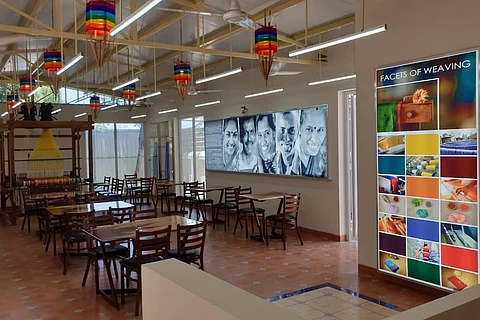

A clover-like design is called a slangai and the design that resembles a bud is called the mokku. Then there’s the koyil and the pogodi, both resembling the shape of a mountain but distinctly different. At the newly opened Handloom Cafe located inside the Chennai Egmore’s Co-optex Showroom complex, these are some of the details about handloom that you can pick up as you take a bite off a crispy samosa and a sip from a tumbler of piping hot tea.
The cafe that was inaugurated on August 7, National Handloom Day, is an initiative by the state-run handloom cooperative to entice the younger generation to look at the concept of handloom with more understanding. “The idea behind it was to invite the younger demographic into Co-optex. I wanted younger people to feel like they can shop from here. And at the same time make it informative to them,” explains TN Venkatesh IAS, Managing Director of Co-optex, who says that this is the first handloom-themed cafe in the country.
“Most youngsters do not know how much of a labour of love a handloom product is. To make a handloom sari, the hands and legs of a weaver move 15,000 to 20,000 times. Now when they are presented with a live loom, they may be able to understand better,” he adds.
A lot has gone into the aesthetics of the cafe. “The aesthetic of the cafe has captured every facet of weaving. From the table and the lamps to the display, all of it is related to handloom,” Venkatesh points out. While the tables have design motifs on them, the ceiling lamps are made using colourful ‘parivattams’. The cafe also displays panels that list out the weaving clusters in Tamil Nadu.
On the evening that TNM visited the cafe, two weavers, both from Kancheepuram, are present at the back of the room, strumming orange, gold and green silk threads as the weaver’s shuttles swish from one corner of the loom to another. Levers are pulled and threads are replenished inside the shuttles while their feet tap the paddles to a rhythm. On either side of this live loom, chairs are placed for patrons to enjoy this process while drinking their coffee.
The cafe is the result of the innovative branding exercise done as part of Tamil Nadu government’s handloom support programme. “We have introduced handmade kurtis, linen cotton readymade shirts, products like quilts and carry bags for the youngsters who stay away from home. The Handloom Cafe too is a part of that idea, for introducing the young generation to Co-optex,” he adds. In 2019, as part of their design initiative, 12 National Institute of Design (NID), Ahmedabad graduates, were hired on a contractual basis to interact directly with weaving clusters in the state to understand design feasibility. As a result, new colour palettes and designs were introduced. Rs 70 lakh has been spent on the cafe’s construction that began in January this year, but was interrupted by the lockdown.
The cafe, which has opened right in time for the festival season, hopes to invite new patrons. Currently, the state allows 50% occupancy in restaurants and has restrictions on the time.
“We want the cafe to draw patrons to the showroom and vice versa,” he adds.
Co-optex that supports one lakh weavers from 20 operational clusters, directly and indirectly, has been able to augment sales through its social media outreach. From having 10,000 followers on Instagram in August last year, Co-optex now has over 24,000 followers. While the coronavirus pandemic has also meant that more people are opting to shop online, Venkatesh shares, “Our business through online sales was Rs 1.5 crore last financial year. This year, we’ve already crossed one crore. We still have seven more months and I'm hoping it would cross Rs 2.5 crore this time.”
Watch: